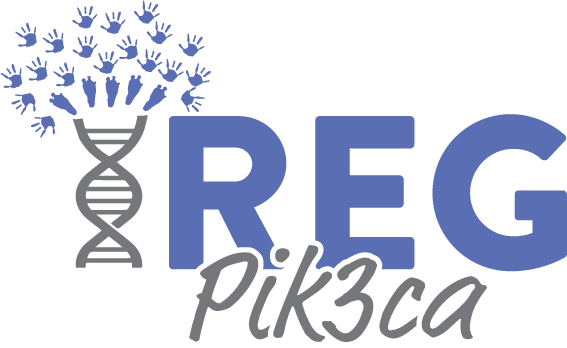IReg-PIK3CA Registry

Project overview
- Short name: IReg-PIK3CA Study
- Area: Rare diseases
- Type of project: Observational, retrospective and prospective study
- Co-Sponsors: University of Turin, Italian Macrodactyly and PROS Association (AIMP) APS (a not-for-profit organization)
- Duration: 20 years
- Status: Active
- Project Manager: Federica Borgini, AIMP
- Scientific Director: Prof. Alessandro Mussa, University of Turin
- Email: registro@associazione-nazionale-macrodattilia.org
Description of the project
The IReg-PIK3CA study is an observational, multicentre, retrospective and prospective, national study.
The study is being co-sponsored by the Department of Paediatric and Public Health Sciences of the University of Turin and the Italian Macrodactyly and PROS Association (AIMP) APS, a not-for-profit organization, with the aim of collecting longitudinal genetic and clinical data (patient history and follow-up data) of people with PIK3CA-related conditions.
Scientific Committee
Membri del Comitato Scientifico
- Prof. Alessandro Mussa, Scientific Director of the study, University of Turin
- Dott.ssa Federica Borgini, Project Manager dello studio, AIMP
- Dott.ssa Paola Sabrina Buonuomo, Bambino Gesù Children’s Hospital
- Dott.ssa Chiara Leoni, Gemelli General Hospital
- Prof.ssa Nicoletta Resta, University of Bari
- Dott.ssa Federica Marino, AIMP
Aim of the study
The retrospective and prospective collection of clinical data by means of a computerised registry (IReg-PIK3CA Registry) to:
- define the natural history of PIK3CA-related conditions in general and of the various phenotypes and genotypes, from a prenatal age/birth to adulthood
- further explore the genotype-phenotype relationship, beyond what is already published in the literature
- estimate the incidence and prevalence of these diseases in general and of the various phenotypes, at a national level
- study patients with a negative molecular diagnosis
- assess the outcomes of the various treatments and various methods of patient management, with the aim of supporting the creation/updating of treatment recommendations and standards of care
- assess the risk of Wilms tumour and other tumours, compare the results obtained with data in the literature and the expected number of cases in the general population, and assess the impact of tumour monitoring protocols implemented at various facilities or the lack of such protocols, through the active collection of data on the development of neoplasms
- assess the effectiveness of various monitoring protocols for Chiari malformation and other neurological defects
- acquire quality of life data by sending electronic questionnaires to patients/parents
- publish analyses and results in specialist scientific journals and broaden scientific knowledge on this specific field of disease.
Selection criteria
Inclusion criteria
- 0–100 years of age
- Informed consent
- People with PIK3CA-related conditions with and without confirmed mutation, selected by the participating sites that are either:
- a) cases with overgrowth disorders classifiable as PROS (PIK3CA-related Overgrowth Spectrum), based on the specific diagnostic criteria listed in Table 1, with and without molecular positivity
- b) cases exclusively with vascular (PIK3CA-related vascular malformations) or nonvascular (PIK3CA-related nonvascular lesions) proliferation, as shown in Diagram 1, in the presence of the PIK3CA mutation.
Exclusion criteria
Patients with a clinical picture that is not compatible with points a) or b) of the inclusion criteria, in the Investigator’s judgement.
Table 1. Clinical Diagnostic Criteria for PIK3CA-Related Overgrowth Spectrum (PROS)
Diagram 1: The three groups of conditions related to the PIK3CA gene mutation: PROS (overgrowth disorders), vascular malformations and nonvascular lesions.
________________
Privacy of data
Right from its initial design, the study has included tools and related settings to ensure data protection (privacy by design) and will only process personal data to the extent that is necessary and sufficient for the intended purposes and for the period strictly necessary for such purposes (privacy by default).
The data, in particular personal, health and genetic data, and only to the extent that they are essential for the objectives of the study, will be processed in compliance with EU Regulation 2016/679, known as the GDPR (General Data Protection Regulation), Legislative Decree no. 101 of 10 August 2018 and the Decision no. 146 of 5 June 2019 of the Italian Data Protection Authority concerning prescriptions for the processing of special categories of data.
Moreover, participants will be assigned an identification code automatically generated by data collection software, which will be used in the demographics form of the Registry and in all subsequently-completed forms that contain clinical data about a specific participant.
The Registry will therefore only include pseudonymised data.
________________
Publications and reports
There are currently no publications or reports available for this study.
________________
________________
Contacts
For further information about the study, please contact the Scientific Committee of the study, by sending an email to:
registro@associazione-nazionale-macrodattilia.org
